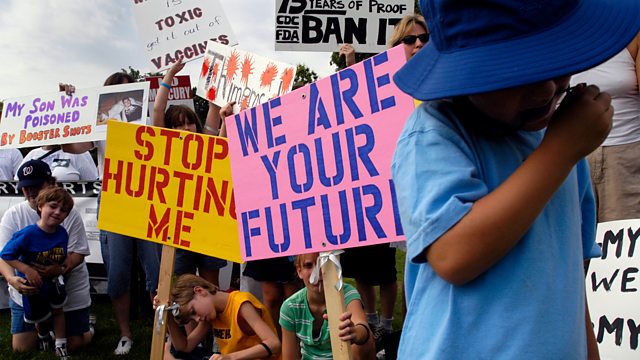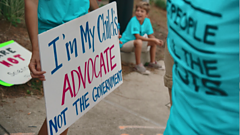
Conspiracy Files: Vaccine Wars
As vaccine-sceptics are blamed by many for surging measles, what do they really believe? Is their fight even about science? And who is spreading their ideas – and why?
As Britain loses its measles-free status and cases surge worldwide, the World Health Organisation has labelled ‘vaccine hesitancy’ one of the top ten threats to global health. But campaigners claim that vaccines are unsafe, and the cause of a health catastrophe. Decades of scientific research don’t back them up. Yet their ideas not only persist, they are reaching around the globe. This programme examines the arguments of those who campaign against vaccines, and hears from people at the heart of alleged conspiracies. It also analyses how vaccine-sceptic ideas are spreading, what gives them currency, and who may be benefiting.
The UK is the home of modern vaccine scares. In the 1970s a paediatric neurologist named John Wilson believed he had seen evidence of brain damage in children following vaccination against whooping cough. His ideas were broadcast in a documentary that plunged Britain into panic. Uptake of the vaccine collapsed, followed by years of whooping cough epidemics.
Years later, exhaustive studies proved that Wilson was wrong. But by then the panic had spread to America, where lawsuits brought the pharmaceutical industry to its knees. The Reagan government passed legislation that recognised vaccine injury, and set up a special court and compensation fund. It should have been a solution, but instead it birthed the notion that the government was acting in the interests not of its citizens but of the pharmaceutical industry.
The most famous vaccine scare followed soon after: the claim by British doctor Andrew Wakefield that the measles, mumps and rubella (MMR) vaccine was linked to autism. With lessons learned from the whooping cough crisis, Wakefield’s hypothesis was swiftly investigated by scientists, journalists, and lawyers in a decade-long trial in the vaccine court. But while evidence was piling up, grassroots organisations and celebrity campaigners took their claims of vaccine danger to public rallies and onto prime-time TV shows. And a scion of the world’s most famous political dynasty, Robert F Kennedy Jr, son of Bobby Kennedy, alleged that a form of mercury used in vaccines was toxic, and that the authorities were concealing the fact.
Wakefield would eventually be discredited and struck off, and the vaccine court definitively ruled there was no connection between vaccine mercury, the MMR, and autism. But the movement that had grown up – fuelled by grassroots campaigners who felt championed by Wakefield and Kennedy – didn’t disappear. Instead, it moved online and on to social media.
Wakefield’s last gamble for mainstream credibility came in a movie alleging a research cover-up at the highest levels of the US scientific establishment, in which documents were destroyed in a dustbin. Following public outcry the film was pulled from Tribeca Film Festival. But claims of censorship gave it an afterlife, online and in Wakefield’s personal appearances at rallies around the US and overseas. There is now evidence that vaccine criticism’s move away from mainstream media has helped, not hindered, its spread around the globe. In India, the uptake of mobile phones means there are now hundreds of millions of users on sites such as Twitter, Facebook and WhatsApp. Antivaccination material from overseas is being viewed by this vast new audience.
Indeed, the wide-ranging ideas that have gathered under the umbrella of ‘vaccine criticism’ make it powerfully adaptable to different countries and cultures. Such as the myths about ‘toxic’ ingredients, which appeal in alternative-medicine-loving France – the world’s most vaccine-doubting country.
If technology is how these ideas are spreading, what is the secret of why they appeal, despite the decades of scientific proof that, despite rare side effects, vaccines are safe? Does the answer lie in the synergy between vaccine scepticism and populist politics? Vaccine criticism is rooted in distrust of expertise and of authority, which may be why populist politicians from Italy’s Matteo Salvini to Australia’s Pauline Hanson and US president Donald Trump have found vaccine scepticism a useful dogwhistle to blow when campaigning – even if they subsequently go quiet on the subject.
And are there more covert state actors at work? Research has uncovered how Russian bots are using antivax hashtags to undermine trust in both government and science in the West. With passions running high, and alarm flaring over rising global measles cases, several countries and US states are making some childhood vaccines mandatory. In the US especially, this is provoking a vocal backlash. Mandates are being painted as the most sinister conspiracy of all – government controlling its citizens’ bodies in order to service its paymasters, Big Pharma. Critics are reaching for a devastating comparison: that compulsory vaccination is akin to the horror of Nazi Germany. Despite the efforts of scientists and authorities, the vaccine wars may be only just beginning.
Last on
Clips
-
![]()
Online vaccine misinformation has politicians worried
Duration: 01:45
-
![]()
Less than half of France’s population think vaccines are safe
Duration: 01:49
-
![]()
Are anti-vaccine activists causing a public health emergency?
Duration: 02:03
Credits
| Role | Contributor |
|---|---|
| Narrator | Saskia Reeves |
| Producer | Victoria James |
| Director | Victoria James |
| Executive Producer | Mike Radford |



